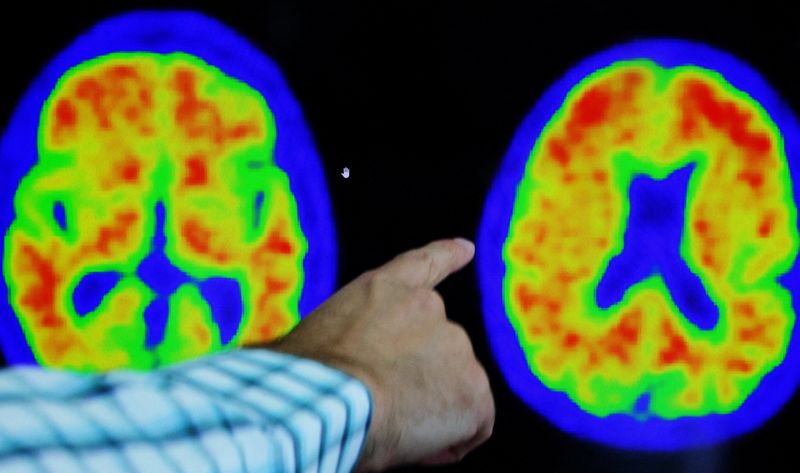By Julie Steenhuysen
CHICAGO (Reuters) - Breakthrough Alzheimer’s treatments that remove toxic proteins from the brain have revived interest in vaccines to treat the memory-robbing disease, potentially offering a cheaper, easy-to-administer option for millions of people, according to interviews with 10 scientists and company executives.
Clinical trials are underway or completed for at least seven Alzheimer’s vaccines designed to harness the immune system to rid the brain of the disease-related proteins beta amyloid or tau, a review of the U.S. government’s ClinicalTrials.gov database found. More are on the way.
The renewed interest in Alzheimer's vaccines follows a promising first attempt more than 20 years ago that was abandoned after 6% of study volunteers developed life-threatening brain inflammation known as meningoencephalitis.
Researchers then pivoted to a safer route, infusing highly targeted man-made antibodies into patients that sidestep the body’s immune machinery.
Eisai and Biogen (NASDAQ:BIIB)'s newly launched Leqembi and Eli Lilly (NYSE:LLY)'s donanemab, now under U.S. regulatory review, are two such treatments that cemented the view that removing amyloid is key to fighting Alzheimer’s in people with early-stage disease. That success followed years of failures that left many experts questioning the amyloid theory.
Scientists, including those at Vaxxinity, AC Immune and Prothena, believe they now understand what went wrong with the first vaccine and are testing shots they hope will provoke an immune response without causing excess inflammation. The U.S. Food and Drug Administration has given the first two fast-track status, which should speed review of those vaccines.
Dr. Reisa Sperling, an Alzheimer's researcher at Mass General Brigham in Boston, said she believes vaccines will play an important role as researchers look to prevent Alzheimer's. “I'm very keen that that's where we need to go.”
Sperling is leading a trial in cognitively normal people with Alzheimer's proteins in their brain. She is considering vaccines for her next study in asymptomatic people with Alzheimer's proteins in their blood, but not enough to register on brain scans.
Alzheimer's vaccines are still in the early stages and will require large, years-long trials to show they work.
Still, a vaccine given quarterly or twice a year could offer a respite from Leqembi’s expensive twice-monthly infusions, expanding access among the estimated 39 million people globally with Alzheimer’s.
"They could be worldwide, and not that expensive," said Dr. Walter Koroshetz, director of the neurological disorders division of U.S. National Institutes of Health.
'THE GATES HAVE OPENED'
Vaxxinity may be furthest along, having already completed a small Phase 2 trial of its vaccine, UB-311. Chief Executive Mei Mei Hu said Leqembi’s success validated a long questioned hypothesis.
"What we know is that if we knock out certain bad forms of amyloid, we will see an effect in clinical outcomes, and that's amazing," she said of Leqembi's ability to slow cognitive decline.
Data from Vaxxinity's Phase 2a trial of 43 volunteers in Taiwan published in August showed the vaccine was safe and tolerable after 78 weeks, with almost all participants producing an antibody response. There were no cases of brain swelling, but 14% (6) developed brain bleeding, a side effect also common to the infused treatments.
Vaxxinity has been seeking a partner to help fund a larger, confirmatory trial, but found the climate over the past few years "quite frigid," Hu said. “With (Leqembi’s) approval, the gates have opened, and there's a lot more enthusiasm, a lot more investment." WHAT WENT WRONG
The first Alzheimer's vaccine demonstrated signs of benefit, but also triggered an out-of-control response from the immune system's T-cells, which are only supposed to destroy infected cells.
Most of the newer vaccines target B cells, immune cells that produce antibodies. AC Immune's vaccine only activates B cells, said Dr. Michael Rafii of the University of Southern California. In a Phase 1 trial led by Rafii, the AC vaccine did not cause any meningoencephalitis, but only a subset of participants developed an immune response. The company is now testing a reformulated version.
AC Immune CEO Andrea Pfiefer suggested that the sustained immune response to its vaccine in some patients explains the lack of brain swelling or bleeding seen with monoclonal antibodies like Leqembi, which peaks after each infusion. More data is expected in the first half of 2024. AC is also collaborating with Johnson & Johnson (NYSE:JNJ) on a vaccine that targets tau, a toxic Alzheimer's protein associated with brain cell death. Prothena, which was spun out a decade ago from a company that co-developed that first vaccine, next year hopes to begin a trial of a vaccine that targets both amyloid beta and tau with the aim of Alzheimer's prevention.
Prothena also has an anti-amyloid antibody in Phase 1 trials and an anti-tau antibody licensed to Bristol Myers (NYSE:BMY) Squibb.
Prothena CEO Gene Kinney said the company's vaccine produces high levels of mature antibodies. Generating a strong immune response is critical for such vaccines, which would typically be given to older individuals with weaker immune systems, he said.
He sees vaccines as ideal for people with pre-symptomatic Alzheimer’s. “What you want to do is prevent the disease from occurring in the first place.”
